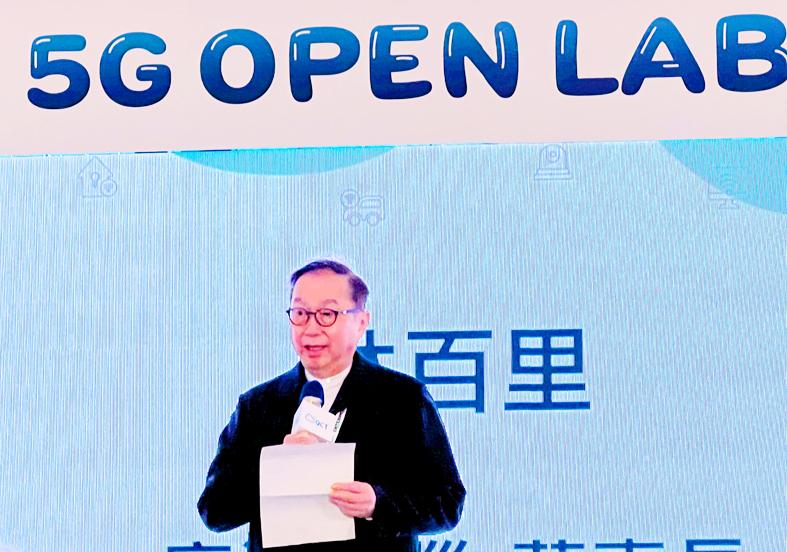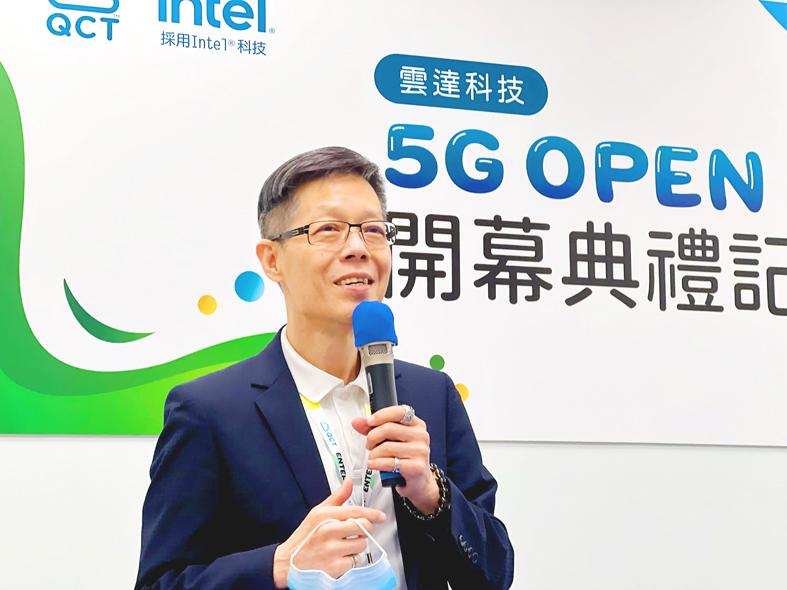Quanta Cloud Technology (QCT, 雲達科技), a server unit of Quanta Computer Inc (廣達電腦), yesterday said it would accelerate its expansion of capacity next year to catch up with growing demand for servers and cloud-computing products.
QCT has two new investments in the US totaling US$42 million to fund the expansion of laptop and server assembly lines, and to “support the future growth of our server business,” QCT president Mike Yang (楊麒令) said.
“We are also adding a new factory in Thailand and preparing for capacity expansion in Europe,” Yang said. “We are investing in a promising future.”

Photo: CNA
In total, QCT plans to introduce more than 10 new production lines next year, Yang told a media briefing, following the launch of the company’s first 5G Open Lab in New Taipei City’s Linkou District (林口) in collaboration with Intel Corp.
The lab would assist partners in carrying out end-to-end integrated development and testing on a private 5G network set up by QCT, and would serve as an incubation center for 5G solutions, the company said.
Yesterday at the lab, QCT demonstrated how smart manufacturing works on 5G enterprise private networks. The lab offers services for customers from Taiwan, Japan, Singapore and South Korea.

Photo: CNA
To meet demand from more customers, the company plans to open a similar lab in Germany next year and another one in the US, Yang said.
Despite the challenges ahead, the company has landed “more orders for next year than this year,” Quanta chairman Barry Lam (林百里) said
“Some customers placed orders for the whole of next year, or even for the next two years. This is the first time in Quanta’s 30-year history that we have seen short supply and such a long period of ordering,” Lam said.
Next year, the supply of materials and components should gradually improve, although it could remain a concern, Lam said.
Quanta is facing a less severe situation than other firms, given its large-scale production and prestigious customers, he added.
Lam said that Quanta should see continued revenue growth for the whole of this year, after revenue increased 2.41 percent to NT$1 trillion (US$36.08 billion) in the first 11 months, up from NT$981.04 billion for the same period last year.
Asked what he thought of the metaverse, Lam said Quanta is ready with augmented-reality and virtual-reality devices, and hopes to create more business opportunities through the 5G lab.

SEMICONDUCTORS: The German laser and plasma generator company will expand its local services as its specialized offerings support Taiwan’s semiconductor industries Trumpf SE + Co KG, a global leader in supplying laser technology and plasma generators used in chip production, is expanding its investments in Taiwan in an effort to deeply integrate into the global semiconductor supply chain in the pursuit of growth. The company, headquartered in Ditzingen, Germany, has invested significantly in a newly inaugurated regional technical center for plasma generators in Taoyuan, its latest expansion in Taiwan after being engaged in various industries for more than 25 years. The center, the first of its kind Trumpf built outside Germany, aims to serve customers from Taiwan, Japan, Southeast Asia and South Korea,

POWERING UP: PSUs for AI servers made up about 50% of Delta’s total server PSU revenue during the first three quarters of last year, the company said Power supply and electronic components maker Delta Electronics Inc (台達電) reported record-high revenue of NT$161.61 billion (US$5.11 billion) for last quarter and said it remains positive about this quarter. Last quarter’s figure was up 7.6 percent from the previous quarter and 41.51 percent higher than a year earlier, and largely in line with Yuanta Securities Investment Consulting Co’s (元大投顧) forecast of NT$160 billion. Delta’s annual revenue last year rose 31.76 percent year-on-year to NT$554.89 billion, also a record high for the company. Its strong performance reflected continued demand for high-performance power solutions and advanced liquid-cooling products used in artificial intelligence (AI) data centers,

Gasoline and diesel prices at domestic fuel stations are to fall NT$0.2 per liter this week, down for a second consecutive week, CPC Corp, Taiwan (台灣中油) and Formosa Petrochemical Corp (台塑石化) announced yesterday. Effective today, gasoline prices at CPC and Formosa stations are to drop to NT$26.4, NT$27.9 and NT$29.9 per liter for 92, 95 and 98-octane unleaded gasoline respectively, the companies said in separate statements. The price of premium diesel is to fall to NT$24.8 per liter at CPC stations and NT$24.6 at Formosa pumps, they said. The price adjustments came even as international crude oil prices rose last week, as traders

SIZE MATTERS: TSMC started phasing out 8-inch wafer production last year, while Samsung is more aggressively retiring 8-inch capacity, TrendForce said Chipmakers are expected to raise prices of 8-inch wafers by up to 20 percent this year on concern over supply constraints as major contract chipmakers Taiwan Semiconductor Manufacturing Co (TSMC, 台積電) and Samsung Electronics Co gradually retire less advanced wafer capacity, TrendForce Corp (集邦科技) said yesterday. It is the first significant across-the-board price hike since a global semiconductor correction in 2023, the Taipei-based market researcher said in a report. Global 8-inch wafer capacity slid 0.3 percent year-on-year last year, although 8-inch wafer prices still hovered at relatively stable levels throughout the year, TrendForce said. The downward trend is expected to continue this year,